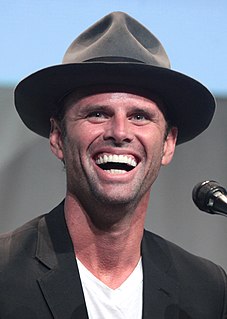A Quote by Amy Tan
I have survivor skills. Some of that is superficial - what I present to people outwardly - but what makes people resilient is the ability to find humour and irony in situations that would otherwise overpower you.
Related Quotes
If you have a sense of irony or humour, you're usually cut down, as you're usually distorted or misinterpreted. So it does lead to us being slightly more dour and staid and predictable than would otherwise be the case, which I personally find quite frustrating - because if you don't laugh occasionally in my job, you cry most of the time.
People can be extraordinarily resilient and show extraordinary grace and humour even in moments of tribulation. I've always found that it's much easier for people who are not terribly, badly off to lose hope and to be pessimistic. I suppose that when you are in a really serious situation, you have to be present, you have to think about it, there's not much scope for self-pity.
It was not possible for us to produce the same optimism and the same kind of humour or irony. Actually, it was not irony. Lichtenstein is not ironic but he does have a special kind of humour. That's how I could describe it: humour and optimism. For Polke and me, everything was more fragmented. But how it was broken up is hard to describe.
The thing about humour is that the super-ego is also at play, so what interested me, particularly in the last chapter which is key to the book -and no one seems to have picked this up in writings on Freud - is that, in the later Freud, the essence of humour is the ability to look at myself and find myself ridiculous. That makes me laugh.
Simply put, dramatic irony is when a person makes a harmless remark, and someone else who hears it knows something that makes the remark have a different, and usually unpleasant, meaning. For instance, if you were in a restaurant and said out loud, "I can't wait to eat the veal marsala I ordered," and there were people around who knew that the veal marsala was poisoned and that you would die as soon as you took a bite, your situation would be one of dramatic irony.
I take it as a real compliment that people believe that I can in some ways mine the disenfranchised, the marginalized, the somewhat off-center - psychologically speaking - people in our society, and bring a real humanity to them, and make people see what would otherwise be a person that you would hate. Find a reason to love them and see the world from their point of view.
People, to maintain their self-esteem, tend to believe they are above average on all positive qualities - height, income, intelligence, sense of humor, negotiating ability, you name it. The problem is that if we are going to really build our skills, we need to know which skills are most deficient. So, I advise people to find confidantes to tell them the truth. And then act on that knowledge to build the abilities they need to be more successful.
Irony is about contradictions that do not resolve into larger wholes, even dialectically, about the tension of holding incompatible things together because both or all are necessary and true. Irony is about humour an serious play. It is also a rhetorical strategy and a political method, one I would like to see more honoured within socialist-feminism.






































